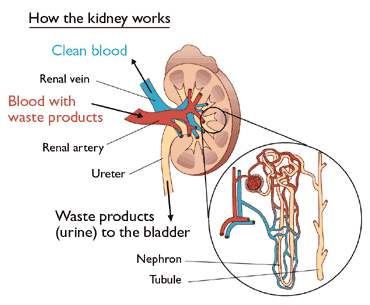A kidney function test, or renal function test, is a group of tests which evaluate the health and efficiency of your kidneys. Referred to as a KFT, it consists of several bio-markers to assess the function of your kidneys. Changes in Kidney function can occur due to factors such as dehydration, heavy metal toxicity, over the counter or prescription drugs, renal insufficiency, liver dysfunction, or renal disease. Shifts in these biomarkers can also indicate unhealthy bladder function, UTI’s or prostate problems in which case further testing for various other conditions are required.
What is the Main Function of The Kidneys?

As part of your urinary system, the kidneys are in the back of your abdomen just below your ribcage. They filter waste materials and expel them from your body as urine. Your kidneys are also vital for producing hormones to regulate blood pressure, Red Blood Cells for oxygen transportation, and producing vitamin D for bone and muscle health.
When Do You Need a Kidney Function Test?
If you experience conditions such as diabetes, hypertension or frequent urinary tract infections, a kidney function test is advisable to guage the effect of such issues on the kidneys. A KFT is also prescribed in the case of such symptoms like
- Hematuria (blood in urine)
- Dysuria ( Painful urination)
- Frequent urination
- Urination problems
The common biomarkers used in kidney function tests include:
Urea
Urea is a waste product formed in the liver from the breakdown of proteins and is excreted by the kidneys. Urea levels are often measured alongside BUN levels to assess kidney function. Normal urea levels typically range between 7 to 20 milligrams per deciliter (mg/dL).
Interpreting Urea results:
Elevated urea levels may indicate kidney dysfunction, dehydration, or conditions that increase protein breakdown, such as gastrointestinal bleeding or certain infections. Low urea levels may occur in liver disease, malnutrition, or overhydration.
BLOOD UREA NITROGEN (BUN)
BUN, or blood urea nitrogen, is used predominantly to measure kidney function. BUN reflects the ratio between the production and clearance of urea in the body. Urea is formed almost entirely by the liver from both protein metabolism and protein digestion. The amount of urea excreted as BUN varies with the amount of dietary protein intake.
Increased BUN levels are a sign of kidney dysfunction. An increased BUN level may be due to increased production of urea by the liver or decreased excretion by the kidney. Increased BUN levels are also associated with dehydration and hypochlorhydria. Decreased BUN levels are associated with malabsorption or a diet low in protein.
CREATININE
Creatinine is produced primarily from the contraction of muscles and is removed by the kidneys. A disorder of the kidney and/or urinary tract will reduce the excretion of creatinine and thus raise blood serum levels. Creatinine is traditionally used with BUN to assess for impaired renal function. Increased creatinine levels are associated with kidney dysfunction, chronic kidney disease, acute kidney injury and a possible dysfunction in the prostate. It is also used to monitor kidney function in those with CKD and to help doctors prescribe appropriate medication and dosage. Decreased creatinine levels are associated with muscle atrophy due to creatinine’s connection to muscle metabolism.
BUN: CREATININE RATIO
BUN (blood urea nitrogen) and creatinine are two blood tests that can reveal a lot about your metabolism, kidney, liver, and overall health. While they can be used separately, the BUN/creatinine ratio can help pinpoint important issues.
A BUN/Creatinine ratio lower than normal can be caused by:
• Low protein intake (malnutrition and/or starvation).
• Advanced liver disease (The Liver can’t make BUN)
• Hypothyroidism (This condition can increase creatinine levels)
• Rhabdomyolysis, a condition in which damaged muscles breaks down rapidly, resulting in higher creatinine levels.
• Kidney damage and kidney failure. When kidneys become impaired for any reason, creatinine blood levels will rise.
• Drugs such as acetazolamide, a diuretic used to treat various conditions including glaucoma, epilepsy, altitude sickness, and heart failure.
A BUN/Creatinine ratio above the normal range can be caused by:
- Dehydration: Dehydration increases the blood levels of both BUN and creatinine but increases BUN more than creatinine.
- Gut bleeding. The blood in the gut gets digested and this increases the amount of protein and BUN levels.
- Hyperthyroidism. This condition can increase BUN and lower creatinine levels.
Glomerular Filtration Rate
Glomerular Filtration Rate (GFR) is the amount of blood filtered every minute by the tiny filters that are part of the Nephrons in your kidney (called glomeruli ) . GFR estimates how much blood passes through the glomeruli each minute. Glomeruli are the tiny filters in the kidneys that filter waste like creatinine from the blood.
It is hard to directly measure one’s GFR. Instead, scientists have developed a formula to estimate the value indirectly. It’s called it the eGFR, or estimated Glomerular Filtration Rate. eGFR often helps in the early detection of kidney dysfunction, which is important to prevent further kidney damage. When other factors (such as age and obesity) are excluded, a reduced eGFR indicates impaired kidney function.
Chronic kidney disease measured by eGFR has the following stages:
Stage 1: Normal, eGFR: > 90 ml/minute
Stage 2: Mild CKD, eGFR: 60–89 ml/minute
Stage 3: Moderate CKD, eGFR: 30–59 ml/minute (30 – 60% of kidney function intact)
Stage 4: Severe CKD, eGFR: 15 – 29 ml/minute (15 – 30% of kidney function intact)
Stage 5: Kidney failure, eGFR < 15 ml/minute (less than 15% of kidney function intact)
However, for values in the range of 60 – 89 mL/min/1.73 m2, doctors will consider kidney disease only if there is additional evidence of kidney damage, such as polycystic kidney disease (cysts in the kidneys), proteinuria (protein in the urine), or hematuria (blood in the urine). If there are no such abnormalities, GFR of > 60 mL/min/1.73m2 is regarded as normal.
Levels that stay below 60 mL/min/1.73m2 for longer than 3 months are a good indicator of chronic
kidney disease. If your eGFR was below 60, talk to your doctor as soon as you can! Your doctor may
suggest further testing (blood, urine, or imaging tests).
Factors affecting GFR:
• Time of day
• Protein intake
• Exercise
• Age
• Pregnancy
• Obesity
• High blood sugar
• Antihypertensive drugs (used for reducing high blood pressure)
• Acute and chronic kidney disease
How to Increase eGFR
• Make sure your blood pressure is in the healthy range.
• Aim for a healthy weight
• Eat a lot of fruits and vegetables
• Quit or reduce smoking
• Exercise for at least 30 minutes several times per week
• Control your blood sugar levels if you have diabetes.
Besides the blood serum test, a urinalysis will also be required to measure the following:
- Urine Albumin: Albumin is a protein normally found in the blood, but it should not be present in urine in significant amounts. The presence of albumin in urine, called albuminuria, can indicate kidney damage. In addition, the urine albumin-creatinine ratio (uACR) will also be measured to guage further extent of protein in the urine indicating kidney damage, albuminuria, or proteinuria.
- Urine Protein: Like urine albumin, the presence of protein in urine (proteinuria) can indicate kidney damage. It’s often measured in a 24-hour urine collection or as a spot urine protein-to-creatinine ratio.
Serum Electrolytes
While blood levels of electrolytes are also prescribed to measure the levels of potassium, sodium, calcium, and phosphate in the blood, it is also an indicator of kidney function. This is because it is your kidneys that help eliminate and regulate excess electrolytes in your system which means kidney dysfunction disbalances electrolyte levels in the body creating either low or high levels of the same both of which can be harmful for health.
The interpretation of these biomarkers in a kidney function test depends on various factors such as age, gender, race, muscle mass, and other medical conditions. Moreover, interpretation of results needs consideration of the patient’s overall health and medical history. Abnormal results may prompt further evaluation and monitoring by a healthcare professional to determine the cause and appropriate management. If you have concerns about your kidney health or receive abnormal test results, it’s essential to consult with a healthcare provider for further evaluation and management. Do not attempt to analyses or interpret your KFT on your own. What might seem alarming and a cause for distress could be a minor rectifiable issue. Always talk to your doctor for his opinion.

